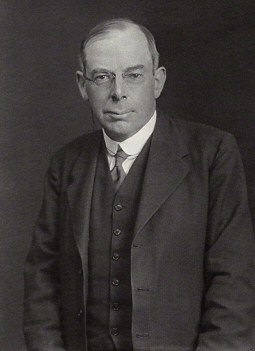Raymond Wilson Chambers facts for kids
Raymond Wilson Chambers (born November 12, 1874 – died April 23, 1942) was a British expert in literature, a writer, and a librarian. He also taught at a university. He spent most of his career working at University College London (UCL).
About Raymond Wilson Chambers
Raymond Wilson Chambers went to University College London for his education. He learned from famous teachers like W. P. Ker and A. E. Housman.
He worked as the main librarian at UCL from 1901 to 1922. He was also an assistant professor in the English department from 1904 to 1914.
During World War I, Chambers helped out. He worked with the Red Cross in France. He also helped the British soldiers in Belgium through the YMCA.
In 1922, he became the Quain Professor of English at UCL. This is a very important teaching position. Chambers wrote many books and articles about English literature, history, and culture. He helped study the parts of the play Sir Thomas More that William Shakespeare might have written. His book about Thomas More, published in 1935, won a special award called the James Tait Black Memorial Prize.
Chambers and J.R.R. Tolkien
Raymond Wilson Chambers was a good friend of J.R.R. Tolkien, who wrote The Hobbit and The Lord of the Rings. They had many things in common:
- Both were Christians (Chambers was an Anglo-Catholic, and Tolkien was a Roman Catholic).
- Both were experts in Old English literature, which is English from a very long time ago.
- Both experienced the difficult times of World War I. Chambers was older, so he wasn't a regular soldier, but he saw the war's effects.
- Both wrote important works about the old English poem Beowulf. Chambers' writings helped inspire Tolkien's famous lecture, "Beowulf: The Monsters and the Critics."
A writer named Thomas Shippey said that Chambers was like a mentor and helped Tolkien a lot when he was starting his career.
Chambers also wrote about an old Middle English text called Ancren Riwle. He thought an older version of this text, put together by James Morton, was very good. Chambers compared the French and English versions of Ancren Riwle. He noticed that the English version had rhymes, but the French one did not. He also felt the English version made the old story of three ladies seem kinder and more pleasant than the original.
John Garth, another writer, noted that the title of Tolkien's book The Book of Lost Tales might have been inspired by Chambers. Chambers had mentioned "the lost Tale of Wade" in his study of the Old English poem Widsith. This study looked at old sea legends from ancient Germanic tribes.
Chambers believed that the Romans didn't respect the Germanic people enough to write down their songs and stories. He also wished that the Anglo Saxons, even King Alfred, had written down more of their old tales. Chambers said, "So this world of high-spirited, chivalrous song has passed away." He felt it was important to "gather up reverently such fragments of the old Teutonic epic as fortune has preserved in our English tongue." This idea of collecting old stories likely inspired Tolkien to create a new mythology for England.
Selected Works by Raymond Wilson Chambers
Here are some of the books and articles Raymond Wilson Chambers wrote:
- Widsith: A Study in Old and English Heroic Legend, 1912.
- Recent Research Upon the Ancren Riwle, 1925.
- Ruskin (and Others) on Byron, 1925.
- On the Continuity of English Prose from Alfred to More and His School, 1932.
- Chapters on the Exeter Book, 1933.
- Thomas More, 1935.
- The Place of St. Thomas More in English Literature and History, 1937.
- Man's Unconquerable Mind, 1939.
 | James Van Der Zee |
 | Alma Thomas |
 | Ellis Wilson |
 | Margaret Taylor-Burroughs |


